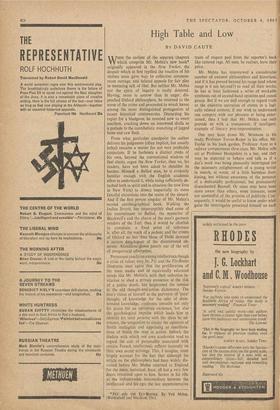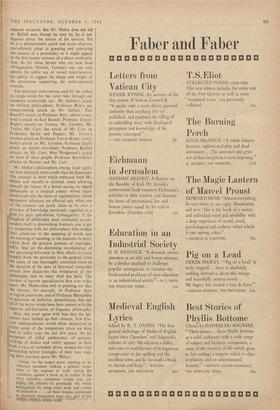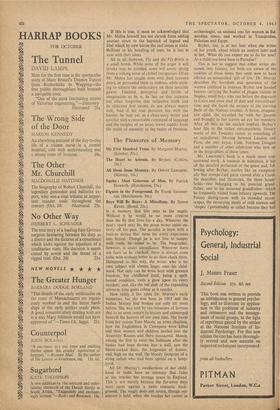High Table and Low
B Y DAVID CAUTE WHEN the earliest of the separate chapters which comprise Mr. Mehta's new book* originally appeared in the New Yorker, the despair which at first typified the reaction of his victims soon gave way to collective common- room outrage, and belated appeals for fair play to menacing talk of libel. But neither Mr. Mehta nor the spirit of inquiry is easily deterred. Having, more in sorrow than in anger, dis- patched Oxford philosophers, he returned to the scene of the crime and proceeded to wreak havoc among the more distinguished protagonists of recent historical controversies. Discarding his rapier for a bludgeon, he resorted now to overt mayhem, cracking down on renowned skulls as a prelude to the cannibalistic munching of jagged bone and raw flesh.
From what particular standpoint the author delivers his judgments (often implicit, but usually lethal) remains a matter for not very profitable conjecture. If he harbours a distinct credo of his own, beyond the conventional wisdom of that elastic organ the New Yorker, then we, his readers, have not been asked to shoulder its burden. Himself a Bafliol man, he is evidently familiar enough with the English academic ethos to understand it, while being sufficiently de- tached both in spirit and in situation (he now lives in New York) to dissect impartially its more fanciful excursions into the realm of the absurd. And if the first person singular of Mr. Mehta's second autobiographical book, Walking the Indian Streets, has imperceptibly shed some of his commitment to Balliol, the mysteries of Blackwell's and the charm of the men's garment vendors of the Turl, then it would be churlish to complain; a fixed point of reference is, after all, the mark of a pedant, and the streets of Oxford no less than those of Delhi demand a certain detachment of the disinterested ob- server. Alienation grows poorly out of the soil of unequivocal admiration.
Permanent condition among intellectuals though a crisis of values may be, Fly and the Fly-Bottle illustrates once again that the proliferation of the mass media and of equivocally educated minds like Mr. Mehta's, with their seductive in- vitation to shed a private eminence at the risk of a public death, has heightened the tension in the old thought-and-action dichotomy. The don's vision of himself as the purveyor of 'pure' thought, of knowledge for the sake of disin- terested knowledge, confronts uneasily not only his desire for an epicurean existence, but also the psychological impulse which leads him to identify his total persona with the ideas he ad- vocates, the temptation to render the opinions of Smith intelligible and appetising as manifesta- tions of Smith the man in action. Indeed, the disdain with which our own academics tend to regard the cult of personality associated with certain French intellectuals reflects inversely on their own secret strivings. This, I imagine, must largely account for the fact that although his article on the philosophers had been widely dis- cussed before Mr. Mehta returned to England for the main, historical, feast, all but a very few doors remained open to him. Secure in his role as the indispensable intermediary between the intellectual and his ego, the last unremunerative *FLY, AND THE FLY-POTTLE. By V d Mehta. (Weidenfeld and Nicolson, 25s.) traits of respect peel from the reporter's back like tattered rags. All men, he realises, have their price.
Mr. Mehta has interviewed a considerable number of eminent philosophers and historians, and if it has proved beyond his range (and whose range is it not beyond?) to read all their works, he has at least fashioned a seiies of workable syntheses out of second-hand opinions and casual gossip. But if we are dull enough to regard truth as the objective narration of events in a logi- cally related context, if our wish to understand can compete with our pleasure at being enter- tained, then I fea'r that Mr. Mehta can only provide us with a transparent, if intelligent, example of literary post-impressionism.
One may hunt down Mr. Strawson in his study, Professor Trevor-Roper in his office, Mr. Taylor in his back garden, Professor Ayer in a railway compartment (first-class, Mr. Mehta tells us) or Professor Hampshire in a bar, and they may be expected to behave and talk as if a day's work was being pleasantly interrupted for the necessary enlightenment of a young writer in search, at worst, of a little harmless foot- kissing, but without awareness of the presence of a dedicatedly professional, but prematurely disenchanted Boswell. Or some may have been more aware than others, some innocent, some not unmindful of the promise of publicity. Con- sequently, it would be useful to know under what guise the interrogator presented himself on each
separate occasion. But Mr. Mehta does not tell us. Balliol man though he may be, he is am- biguous about the nature of his sources. Yet he is a phenomenally quick and acute observer, marvellously adept at grasping and conveying the essence of a personality as it might appear in the first twenty minutes of a direct confronta- tion. As for those heroes who are now dead (Wittgenstein, Namier, Tawney), one can only admire his subtle use of varied reminiscences, his ability to suggest the shape and weight of the gravestone supporting the multi-coloured wreaths.
The principal controversies used by the author as rough steeds for his rural rides through our academic countryside are: Mr. Gellner's attack on Oxford philosophers; Professor 1We's un- compromising attack on Mr. Gellner; Earl Russell's attack on Professor Ryle; almost every- body's attack on Earl Russell; Professor Trevor- Roper's attacks on Tawney, Mr. Toynbee, Mr. Taylor, Mr. Carr; the attack of Mr. Carr on Professors Berlin and Popper; Mr. Taylor's counter-attack on Professor Trevor-Roper; every- body's attack on Mr. Toynbee; Professor Geyl's attack on almost everybody; Professor Berlin's attacks on Mr. Carr; Miss Wedgwood's attack on most of these people; Professor Butterfield's attacks on Namier and Mr. Carr . . .
Mr. Mehta's philosophers emerge (and rightly so) with distinctly more credit than his historians. The amateur (a term which embraces both Mr. Mehta and myself) is inclined, when allowing himself the luxury of a broad survey, to regard Philosophy as a residual subject whose major revolutions take the form of capitulations, whose permanent advances are effected only when one of the sciences can justly claim as its own a province of knowledge previously regarded as a field for pure speculation. Consequently, if the kingdom of philosophy must constantly accom- modate itself to diminishing frontiers, one is apt tO sympathise with the philosophers who confine :heir attentions to the meaning of words and the meaning of meaning, to the bastions, in short, Which show the greatest promise of impregna- bility. And yet the distressing incompetence of our practising historians in their efforts to travel happily from the particular to the general, from the cause of one thoroughly examined event to the question of the laws of historical causation,. ' reveals how disastrous this withdrawal of our Philosophy into its inner shell has been. The streams of narrow specialisation flow ever wider apart. Mr. Mehta does well in pointing out that the interest, for example, of Professor Ayer in logical positivism, and of Professor Hampshire in questions of lesthetics, demonstrates that not all of the better minds have been content with the rigorous self-limitation of linguistic philosophy.
Also, one must agree with him that the his- torians have hashed up their chances. Few first- year undergraduates would allow themselves to . father some of the tendentious trivia we have . had to suffer over the last few years. An at- mosphere of wilful adolescence, of posture- striking, of malice and vanity appears to have bred a race of tarnished p'rima donnas for ever . Pirouetting before footlights of their own mak"- ,i118. Here one may quote Mr. Mehta:
Going for the largest game, creating an in-
tellectual sensation, striking a posture, some- times at the expense of truth, stating the arguments against a book or its author in the most relentless, sometimes violent way, en- gaging the . interest of practically the whole intelligentsia by using every nook and cranny of journalism . . . all these features prominent in historical dkputation 'Were alszsart of the Helder ruglish mental If this is true, it must be acknowledged that Mr. Mehta himself has not shrunk from adding another straw to the haystack of legend and libel which by now buries the real issues at stake. 'Brilliant in his handling of men, he is less at ease with their ideas.
All in all, however, Fly and the Fly-Bottle is a small bomb. While some of the anger it will invoke may be justified, some will surely spring from a sinking sense of chilled recognition. Often Mr. Mehta has caught dons with their trousers down, or persuaded them to undress, while seem- ing to admire the embroidery on their invisible gowns Talented, perceptive and fertile of imagination as he is, he has on this occasion too often forgotten that subjective truth and its objective first cousin do not always marry
Well And if his true province lies with the 1 former, he may yet, as a short-story writer and novelist with a remarkable command of language and the insights of an artist, travel rapidly from the realm of necessity to the realm of freedom.












































 Previous page
Previous page